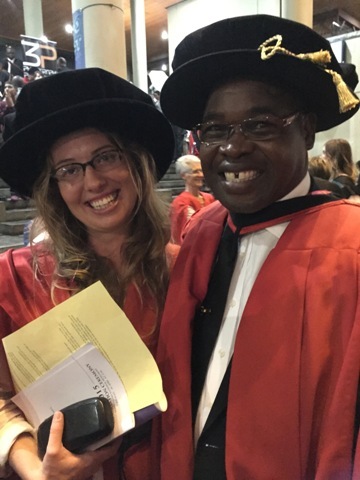
The Rhodes University Environmental Learning Research Centre graduated two PhDs. Their research both offer new knowledge of social learning in contexts of social-ecological risk and uncertainty in rural natural resource management and food security contexts in rural Africa.
The PhD of Dick Kachilonda was set in the lake regions of Malawi, where up to 70% of the nations food protein is sourced directly from the lake. With high levels of poverty, few alternatives and increased numbers of people depending on the natural resources it is no surprise that the fishery is declining.
This is of concern to the local Chiefs, the government, communities, fishers and extension and training officers responsible for support and extension services. In response the government of Malawi has introduced co-management as a new paradigm for sustainable management of fisheries in Malawi, a trend reflected more widely in African natural resources management, including fisheries.
However, the problem identified by Dick in his thesis, is that co-management approaches assume ongoing co-learning, yet extension and training programmes are often still framed within a knowledge transfer paradigm.
Dick Kachilonda, one of the PhD graduate’s, research was set in the lake regions of Malawi, where up to 70% of the nation’s food protein is sourced directly from the lake. With high levels of poverty, few alternatives and increased numbers of people depending on the natural resources, it is no surprise that the fishery is declining
Working with multi-stakeholder groups along the shores of Lake Malawi – including fishers, extension trainers, NGOs, government officials and researchers, and members of Beach Village Committees, Dick engaged these groups in identifying and engaging core contradictions that exist within and between the actors’ activities and the systems that support their activities (e.g. implementing policy, doing research, offering training, or fishing). He did this using an engaged and generative approach to learning and research in the Cultural Historical Activity Theory research tradition.
Dick’s PhD study pioneered a new approach to social learning in fisheries co-management that also provides a new model for extension training in Africa. Dick Kachilonda is a first generation graduate, and the first in his family to obtain a PhD. He achieved this through many years of educational engagement and commitment, starting with a Fisheries Diploma, followed by an International Certificate in Environmental Education, an Advanced Certificate in Environmental Education from Rhodes University (obtained cum laude), a Masters Degree in Environmental Education from Rhodes University (obtained cum laude) and finally the PhD! As Dick says “it was a long journey”.
Also a first generation degree holder, and the first in her family to obtain a PhD, Nina Rivers graduated with her PhD after being encouraged to apply for an upgrade of her Masters Degree in 2014 based on the quality and scope of the work she had compiled for her Masters Degree. After approval from the Higher Degrees Committee, Nina set about finalizing her PhD, focusing on the mediation of women’s learning of using rainwater tanks for increasing household food security in rural areas in the Eastern Cape, South Africa.
Nina’s study found that in rural (and some peri-urban) areas many women rely on water from rainwater tanks to supplement household food production. Rainwater tanks are often ‘given’ to communities by governments or NGOs but few stop to think about how women learn to install, use and manage the tanks, and the water associated with these tanks. Yet such knowledge and learning is central to social justice, and to the efficient use of these resources for transformation.
Nina’s study found that there were a myriad of factors that mediate women’s knowledge and learning in relation to how water tanks are perceived, used and valued. Amongst these were gender roles and relationships in the household, actual supply of water from government (or not), service delivery failures, technical information sharing, and cultural practices associated with food production and demand. Significantly Nina’s study found that many times, women are failed by the system, yet they show high levels of agency and response-abilty in the face of dire circumstances.
Nina’s study confirmed that learning practices such as rainwater harvesting using rainwater tanks is a socio-culturally mediated and situated process. There are no short cuts, and effort and energy should be put into supporting women and their households to use conservation and food security technologies such as these tanks.
In sum, Nina’s PhD uncovered how women gain knowledge of, and learn rainwater harvesting practices, especially associated with the installation, use and maintenance of rainwater tanks, which for many provide their only supply of water. Her study provides rich insight into the role of context in learning, and into socio-cultural mediation, informing new ways of supporting adult learning.
Congratulations Dick and Nina!
Both studies will be available on the Rhodes University electronic repository in due course.
